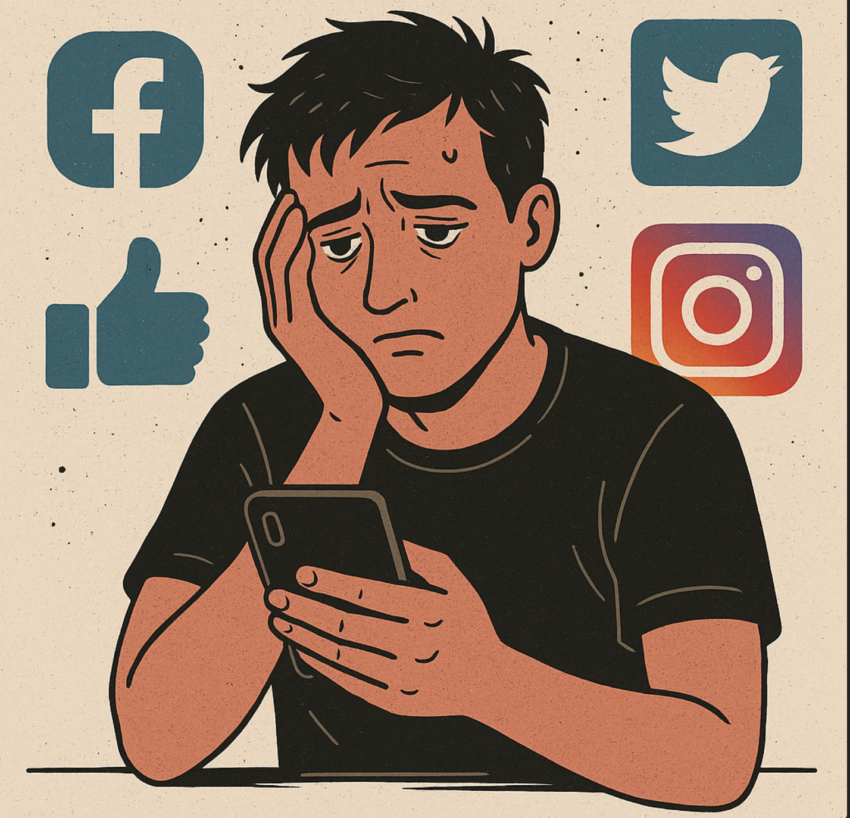You’re Not Addicted to Social Media, Right? That’s What Every Addict Says.
Let’s cut the shit. You didn’t open Instagram to “check something real quick.” You opened it because your brain has been trained to need it. You don’t even realize you’re doing it half the time. One minute you’re unlocking your phone, the next you’ve lost thirty minutes to a blur of reels, tweets, thirst traps, and viral nonsense you’ll forget by lunch. Your coffee’s cold. Your to-do list is untouched. And for what?
This isn’t just distraction. It’s dependency. And it’s not your fault, but it is your problem.
Social media addiction isn’t about liking a few posts or sharing a vacation photo. It’s about that compulsive, automatic behavior where reaching for your phone becomes a reflex. It’s about checking your notifications in bed before you’ve even said good morning to the person lying next to you. It’s about craving validation from strangers instead of having real conversations with people who actually matter.
The scary part is that these platforms were built to do this to you. This isn’t accidental. They are designed like slot machines, running on psychological reward systems that hook your brain and keep it coming back. Every like, every comment, every new follower is a hit of dopamine. Your brain lights up. It feels good. And then it wants more. The cycle begins.
You open the app because you’re bored, anxious, lonely, or just trying to avoid whatever is going on in your life. You get a small reward. You feel seen, distracted, entertained, maybe even important. But that feeling doesn’t last, so you open it again. And again. And again. Eventually, you don’t even know what you’re looking for. You’re just hoping something will make you feel better. Usually, it doesn’t.
You’ve probably seen the signs already. You reach for your phone without thinking. You feel annoyed when there’s nothing new to check. You’ve tried to cut back, but somehow you’re still hitting your screen time cap by noon. You compare yourself to other people and feel like shit afterward. You scroll past happy people and perfect bodies and curated lives, and somewhere deep down you start thinking yours doesn’t measure up. You can know it’s fake and still feel awful.
The cost of all this is more than just time. It’s your focus. Your self-respect. Your ability to be present. Heavy social media use has been linked to anxiety, depression, poor sleep, shorter attention spans, and low self-esteem. That creeping sense of emptiness you feel after a long scroll? That’s not coincidence. That’s the effect of spending hours being passively stimulated by things that don’t actually matter.
You don’t have to swear off social media forever or disappear into the woods. But if you’re serious about getting your head back, you need to start making changes. Turn off the notifications. They’re just digital cattle prods trying to drag you back in. Delete the app for a few days. You’ll be shocked how often your fingers still reach for it. Replace some of that screen time with something that builds you instead of breaking you. Read something real. Take a walk. Call someone. Stare at the ceiling and let your brain breathe for once.
This isn’t about being perfect. It’s about being honest. You are not in control if your first instinct in the morning is to check your feed. You are not okay if your self-worth rises and falls with the number of likes you get on a post. That’s not balance. That’s a slow leak in your life, and the longer you ignore it, the more damage it does.
Social media is not evil, but it is engineered to consume your time, your energy, and your attention. If you don’t set boundaries, it will keep taking until there’s nothing left but anxiety, comparison, and a habit you can’t break.
You don’t need a digital detox retreat or some mindfulness guru telling you how to live. You need to give a shit. You need to decide what your attention is worth and who gets it. Because if you don’t protect it, someone else will monetize it. That’s not paranoia. That’s the business model.
You’re not powerless. You’re just distracted. But that can change. Starting now.
About the Author: Adam Faight is a college director, psychology instructor, and author based in Johnstown, Pennsylvania. He explores the intersection of technology and human behavior, writing extensively on topics such as social media’s impact on mental health and modern relationships.
